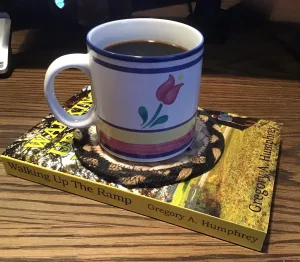You have to read this news story if you too have been trying to grasp, since November 2016, what made so many Caucasians lose touch with reality. I constantly read and talk with many who cross my way, and though I hear the Caucasian resentments I never can make it sound rational. I can not get my head around how people–as in the story in the newspaper– truly process the happenings in their local communities with such a high degree of fear and loathing. To make that so would mean those Caucasians are bereft of religious training, morals, or any historical background about the nation in which they live. They would have to be totally lacking of any sociological understanding of the present times. I can not fathom how people can be so adrift from the rest of the nation.
In a country where whites will lose majority status in about a quarter-century, and where research suggests that demographic anxiety is contributing to many of the social fissures polarizing the United States, including immigration policy, welfare retooling and the election of Donald Trump, the story of the coming decades will be, to some degree, the story of how white people adapt to a changing country.
It will be the story of people such as Heaven Engle and Venson Heim, both of whom were beginning careers on the bottom rung of an industry remade by Latinos, whose population growth is fueling that of the United States, and who were now, in unusually intense circumstances, coming to understand what it means to be outnumbered.
There were days when Venson imagined what might await America. This would be a nation where whites weren’t only a minority, but disadvantaged, punished for their collective crimes, because, as he put it, “we haven’t been the nicest race.” Speaking Spanish wouldn’t just be beneficial, but essential, and people like him would never be able to recover from what they didn’t know. “Screwed for life,” he said.
These were relatively new thoughts for him. Until now, his entire life had been lived in one America, the America of Jonestown, Pa., where he shared a drab two-story rental with his mother in a neighborhood of neat yards, basketball hoops and trucks parked in the driveways. He graduated from Northern Lebanon High School, whose demographics the principal, Jennifer Hassler, struggled to describe as “Diversity isn’t necessarily — we don’t have a lot of diversity, we just don’t.” On weekends, his family took day trips to nearby Hershey’s Chocolate World.
But since he’d started at Bell & Evans, and been plunged into another America, this one less familiar, race had been on his mind all of the time. He thought about it when Heaven said she wanted to quit. He thought about it when his mother vented about finding jobs for the immigrants at her temp agency, and when he watched the news on his big-screen television in his room, amid his sports posters, work boots and video games.
He didn’t understand why people said the United States should allow in more immigrants. If a Syrian needed asylum from a murderous regime, then yes, the country should help. But anyone crossing the border seeking jobs, even government assistance — that didn’t seem fair. What about the people already here? What about the homeless? What about him? He was the one, after all, whose career had been shaped by Washington policymakers, who he believed didn’t know what it was like to be an outsider in your own community — a feeling that had become as ordinary to him as the wrench in his back pocket, which he now took out to tinker with a malfunctioning batter machine.
“The motors are burning because they’re constantly running,” Venson shouted over the clamor, but only got confused looks in return.
Three white mechanics in blue smocks were huddled around the machine. Ten Latino workers in white smocks were huddled around them, watching as Venson unscrewed a clogged pipe to drain the excess batter, then screwed it back on. The white men stood up and, with another job done, returned to the mechanics’ break room, finding a mess of junk food and drinks and a giant American flag hanging in the back from ceiling to floor. They took off their smocks and hairnets. Venson sat at the picnic table. He took in a slow breath and let it out.
The truth was that he loved this job. He didn’t have a vocational degree, like some of the mechanics, or any experience, like others. But in just one year, he’d gotten so good at it that his bosses had bumped his hourly pay from $13.50 to $17. When the Pacmac or the DSI Portioning System acted up, he was the one who knew what to do, not because he was a savant, but because he’d worked at it, day after day, which was why he became so frustrated when workers in that department didn’t ask him for assistance. They wanted help only from Juan Leon, the shift’s lone Latino mechanic, a Puerto Rican transplant whom Venson genuinely liked and appreciated, but who didn’t know those machines. Venson did. So why didn’t they ask him for help? Why did they want solely another Latino? How did it get to be this way?


I read this too and found it deeply troubling. Yeah, you’ve heard from me before how I was one of those working-class whites who pulled himself up by the bootstraps and got a world-class education, only to find myself working in a blue-collar job anyway. I know that you were hardly a child of privilege yourself. But I don’t know if it was even worth it, Gregory. What could I say to people like these? Bust your ass so you can be like me? Vote for Democrats who are in bed with Wall Street? I have no answers anymore.
It troubled me that it seems the only time cultures blend in this story is at the workplace. How can that be? People talk at parks, county fairs, etc and it is in those interactions that people learn about others, and that we are not all the same, I also wonder how the changing demography seems to be hitting some as news. And how is it that in the smaller places– population wise–the hatred runs deepest? How is it that the lack of American workers in almost every industry exists and yet when there are those from other nations who come here to do the work businesses need–and citizens will not take–those with brown skin get scorned? Like you, I have no answers. I read and talk and try to understand what happened and is still happening and I am not able to make it compute. Like you I had to make it on my merits. I had to take my thin self and put one foot in front of the other. And like you I never thought others who walked alongside me did not deserve to be there because they might be brown, or Muslim, or black or…… I simply have no way to grasp the xenophobia or the absurd nationalism. It makes sense looking backwards at times in history how it happened but living in the storm i am lost. The forest for all the trees has me confused. Thanks, Peter.
Heartfelt reply. Thank you. I read this piece first thing in the morning and I’ve been thinking about it all day long. If I was this young couple, my approach would be to learn a working amount of Spanish. But that’s just me. I’m already bilingual (Russian, heh) and have a college degree in the hard sciences. So picking up a smattering of Spanish is not that big of a deal. I have friends who are high-school-educated cooks and they speak fluent Spanish, which they picked up on the job. And they don’t resent it either, because they have nothing but respect for Latino kitchen staff. The chicken factory seems like a different situation but I’m not quite sure how. Also the Canadians I know seem mostly to resent the French speakers. Like I said, this has been whirling around in my head all day and I’m no closer to an answer.
I read the article on MSN this morning and my first thought was, as James Carville used to say, Pennsylvania is Pittsburgh on one end and Philly on the other and Alabama in the middle. This afternoon we were on State Street at an outdoor table and watching the vibrant scene. As we were scarfing down gyros and French fries the street was filled with all kinds of activity, including people in town for the Cross Fit Games. The scene and the article also reminded me of the study done by a UW researcher about the resentment people in “outstate Wisconsin” have against Madison, UW and public employes. And yet, when the local team gets into a state tournament, Madison is filled with parents, athletes and students who think State Street is a great street and Madison is a fun and vibrant town. I would hope that parents and grandparents would think their child getting a degree and teaching or building bridges or doing medical research is a good thing. Yet they bitch about someone who’s gone to school and has benefits and good pay in a job in their town is “a have.” Todd Nowak, the state rep. who is afraid to say he is a republican in his district ran ads criticizing his opponent for graduating from an ivy league school. The horror! Similarly, the people in this article can blame “the others.” I don’t want to go to school, or get some training and I don’t want to leave Podunk, PA but I blame “the others” for my fate, for my mind numbing job, for the high costs of cigarettes and smart phones “pitchered” in the article. (OK, the last two were kind of judgemental :). Talk about victim mentality. Meanwhile voting against their self-interest to get $5 a week tax cut from Trump and the Republicans while the fat cats use $100 bills to light their cigars. Actually, I don’t worry too much about Heaven and Venson voting.
Stop taking heroin and opioids, write a resume, get an alarm clock and move off the couch. That would solve much of what I see here in Ohio from lazy people.